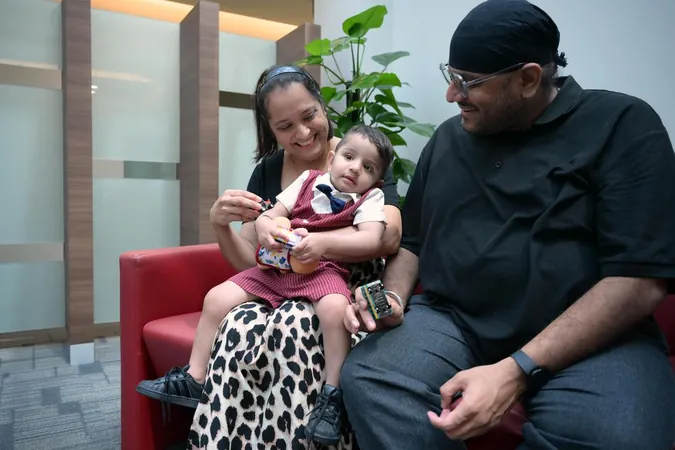
Miracle at Birth: How Early Detection of 'Bubble Boy Disease' is Saving Lives
2025-06-09
Author: Jia
A New Hope for Newborns: The Power of Early Detection
In a heartwarming tale from Singapore, six-day-old Mannat Singh was diagnosed with severe combined immunodeficiency (SCID), a rare condition that leaves newborns without a functioning immune system, rendering them defenseless against even minor ailments like the flu.
His mother, Harminder Kaur, 39, expressed her overwhelming guilt and concern, believing she had somehow caused her child's plight. But their journey took a positive turn thanks to groundbreaking medical advancements.
What is SCID and Why It’s Critical to Act Fast
SCID, often referred to as 'bubble boy disease,' is a life-threatening genetic disorder that impacts approximately one in every 50,000 infants globally—meanwhile, Singapore sees a new case every two years. Historically, this condition has captured public interest since the story of David Vetter, an American boy who lived his life confined to a sterile bubble due to SCID.
With no matching bone marrow donor available back in David’s era, he tragically passed away at 12 from complications related to the disease. Fast forward to today, and significant improvements in detection and treatment are giving hope to families like Mannat's.
Early Screening Saves Lives
Fortunately, Mannat's rare form of SCID, known as Artemis SCID, was diagnosed through Singapore's National Expanded Newborn Screening (Nens) programme, which started in 2006 and expanded in 2019 to include critical conditions like SCID and cystic fibrosis. This initiative saves lives by screening almost every newborn for metabolic and inherited disorders.
By 2024, Nens aims to have screened all newborns in Singapore, achieving a remarkable national screening rate of 96%. The screening involves collecting a blood sample within the first few days of life, checking for T-cell receptor excision circles (Trecs), which indicate if a baby's immune system is functioning properly.
The Path to Treatment
The only effective treatment for SCID is a bone marrow transplant from a healthy donor. This type of stem-cell therapy can help children like Mannat build a functional immune system, drastically improving their chances of survival, especially if done in the first few months of life.
Failure to act before serious infections set in can lower survival rates to as little as 50%. Therefore, early screening is crucial in avoiding life-threatening complications.
A Family's Brave Journey
When Mannat’s diagnosis came through, his parents explored all possible options for providing their son with the best chance at life—immediately entering preparations for treatment. They were relieved when Mannat became the first newborn in Singapore diagnosed with SCID at birth to receive a stem cell transplant from his mother before any symptoms could manifest.
Now, at 19 months old, Mannat is a vibrant, healthy child and the joy of his family's life. 'We feel like we have returned to a sense of normalcy, and we are eagerly looking forward to seeing our boys grow up happy and healthy,' said Harminder with a smile.




 Brasil (PT)
Brasil (PT)
 Canada (EN)
Canada (EN)
 Chile (ES)
Chile (ES)
 Česko (CS)
Česko (CS)
 대한민국 (KO)
대한민국 (KO)
 España (ES)
España (ES)
 France (FR)
France (FR)
 Hong Kong (EN)
Hong Kong (EN)
 Italia (IT)
Italia (IT)
 日本 (JA)
日本 (JA)
 Magyarország (HU)
Magyarország (HU)
 Norge (NO)
Norge (NO)
 Polska (PL)
Polska (PL)
 Schweiz (DE)
Schweiz (DE)
 Singapore (EN)
Singapore (EN)
 Sverige (SV)
Sverige (SV)
 Suomi (FI)
Suomi (FI)
 Türkiye (TR)
Türkiye (TR)
 الإمارات العربية المتحدة (AR)
الإمارات العربية المتحدة (AR)